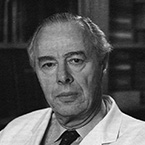
Lee W. Wattenberg, MD, a pioneer in cancer prevention research, died Dec. 9, 2014, at the age of 92. Wattenberg was president of the American Association for Cancer Research (AACR) from 1992 to 1993 and an elected fellow of the AACR Academy in 2013. He became an active AACR member in 1961.
Wattenberg’s work in cancer prevention is legendary. His innovative research established the discipline of chemoprevention, and he was known as the “father of chemoprevention.” Wattenberg first recognized that some compounds could effectively block the development of carcinogens in experimental animals. In 1966, he published a landmark paper in the AACR journal Cancer Research that reviewed 36 years of animal studies on the effects of certain compounds on carcinogenesis and laid the framework for our understanding of how these compounds work. It was in this paper that he introduced the term “chemoprophylaxis.”
He later investigated two categories of chemopreventive agents: synthetic compounds that might prevent carcinogen-induced lung cancer, and dietary constituents, such as the cruciferous plants cabbage and broccoli. He studied the processes that cause irreversibility in carcinogenesis and sought to determine whether and how these processes could be targeted for intervention. Also, most recently, Wattenberg pioneered the use of aerosols to deliver drugs in lung cancer.
A native of New York, Wattenberg received his BS from City College of New York in 1941. He then received his medical degree from the University of Minnesota School of Medicine and was a distinguished faculty member at the university for more than 60 years. He traced his lifelong dedication to cancer prevention to his work from 1944 to 1946 as a junior biologist with the Medical Research Group of the Manhattan Project, whose mission in relation to the development of the atomic bomb was to study the effects of radiation. This early work was inspired by his brother, Albert Wattenberg, PhD, a renowned physicist who worked with Enrico Fermi, PhD, on the development of the atomic bomb for use in World War II.
Throughout his career, Wattenberg was a prolific contributor to the medical literature and presented hundreds of papers at scientific meetings and workshops all over the world. His outstanding contributions to the AACR included terms as associate editor for two AACR journals, Cancer Research and Cancer Epidemiology, Biomarkers & Prevention, as well as service on every major standing committee of the organization, most notably as chairperson of the first AACR Task Force on the topic of Cancer Prevention. He chaired the first cancer prevention symposium at the 1979 AACR Annual Meeting, served as chair of the Annual Meeting Program Committee in 1982, and was a featured speaker at the AACR conferences on Frontiers in Cancer Prevention Research.
Wattenberg was especially dedicated to supporting the professional development of early-career scientists. During his presidency, he launched the Associate Member Council in 1992 to represent the interests of Associate Members in the governance of the AACR. He was later honored for his commitment to the professional advancement of young investigators as the first recipient of the Associate Member Council Award of Excellence, which recognizes AACR members “whose insight, courage, and actions have resulted in significant benefits for associate members.”
“About two-thirds of all cancers are preventable. Because of Lee Wattenberg’s dedication to and belief in the promise of cancer prevention, the field has taken its rightful place as one of the most important areas of cancer research,” noted Margaret Foti, PhD, MD (hc), chief executive officer of the AACR. “Lee has inspired the work of a whole generation of cancer prevention researchers, which in addition to his own personal contributions, will leave a lasting legacy of saving lives from cancer,” she said.
In addition to his AACR service as president, Wattenberg served on the AACR board of directors from 1985 to 1988 and from 1991 to 1994. He was also president of the American Histochemical Society in 1996. His work was recognized by his colleagues with the Naylor Dana Award of the American Health Foundation in 1991, the AACR-American Cancer Society Award for Outstanding Contributions to Cancer Prevention in 1996, and the AACR Award for Lifetime Achievement in Cancer Prevention Research in 2010.
Wattenberg was revered by his colleagues in the cancer field as a self-effacing leader. At a 2011 symposium held in his honor at the University of Minnesota, tributes came from many former students and current colleagues who had been influenced by his true pioneering work. As one symposium attendee told him, “It is your gift to inspire people around you that will leave its greatest mark on those of us lucky enough to know you.”
Career Highlights
2010 AACR Lifetime Achievement Award in Cancer Prevention Research
1998-2001 Chemoprevention Implementation Committee, National Cancer Institute
1996 AACR-ACS Award for Outstanding Contributions to Cancer Prevention
1996 President, American Histochemical Society
1993 Co-Chair, 13th International Symposium on Cancer: Current Strategies for Cancer Chemoprevention, Sapporo, Japan
1992-1993 President, AACR
1991-1992 Board of Directors, AACR
1991 Naylor Dana Award, American Health Foundation
1982-2009 Professor of Laboratory Medicine and Pathology, University of Minnesota
1966-1982 Professor of Pathology, University of Minnesota
1963 Visiting Scientist, Chester Beatty Cancer Research Institute
1985-1988 Board of Directors, AACR
1950 MD, University of Minnesota